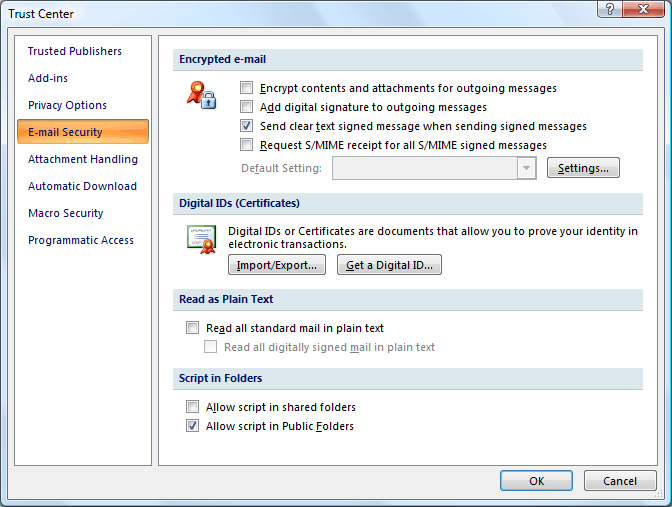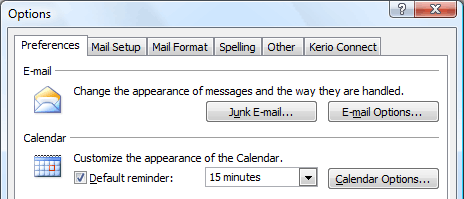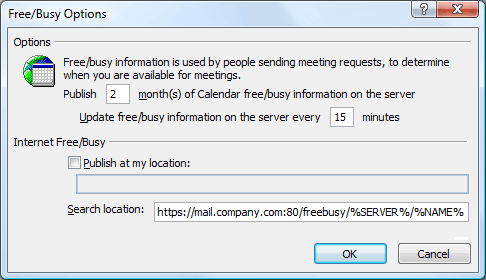Sometimes it may happen that the buttons may be missing on the toolbar when the Kerio Outlook Connector or MS Outlook is started. In such a case, it is necessary to allow Kerio Outlook Connector in forbidden items of MS Outlook.
The installation of Kerio Outlook Connector in Outlook 2000 is different from the installation in previous versions:
Outlook 2000 must have Service Pack 3 installed; if the Service Pack is missing, the installation of Kerio Outlook Connector will fail.
Outlook 2000 must be installed in the Corporate or Workgroup mode. If the installation of Outlook 2000 is performed in the Internet only mode, change the mode in (the installation disc of Outlook 2000 might be required).
Another difference applies to the new profile creation. For more information about profiles and their creation in Outlook, see chapter 6.2.1 Creating a new profile and Kerio account settings.
After a successful installation of Kerio Outlook Connector, create a new profile. This can be done in the following ways:
Creating of multiple profiles by a migration (performed by the system administrator).
Creating a profile by hand.
If a migration tool is used for profile creation, click and add the Outlook Address Book item to the profile. If the Outlook Address Book will not be added to the profile, contacts folders will not work properly.
If a profile is created by hand, it is possible to follow the method described in chapter 6.2.1 Creating a new profile and Kerio account settings. The only difference is that it is necessary to add the Kerio Connect and Outlook Address Book services during creation. Both services can be added to the profile later in menu.
If your messages are digitally signed, in MS Outlook 2003 check the Send clear text signed message when sending signed messages option under on the Security tab (see figure 6.27 Settings of verification of signed messages). For MS Outlook 2007, the option can be found under . This option provides that also Kerio WebMail users may read the message.
During the startup process of MS Outlook extended with the Kerio Outlook Connector, a warning can be displayed that informs of an error detected in settings of contact folders which are used as address books.
This error can be fixed by removing all address books in MS Outlook:
In the menu, select E-mail Accounts to open a wizard where new accounts and address books can be created. In the wizard, select View or change existing directories or address books.
Remove all listed address books and close the wizard.
Restart MS Outlook.
Removing address books does not delete contact folders. All contacts are kept intact. Once all address books are removed from MS Outlook and the application is restarted, it is possible and recommended to add the address books again (for details, see chapter 1.7.4 Searching in contacts).
Failures of connection of MS Outlook to the Kerio Connect's built-in Free/Busy server may be caused by the following issues:
If traffic over SSL is enabled in a Kerio Outlook Connector account settings, the Free/Busy server requires installation of a valid SSL certificate. This certificate can be installed in Internet Explorer. Detailed instructions are provided in section 5.4.1 Appointments.
If the meeting scheduling with the Free/Busy server does not work properly (i.e. the Scheduling tab does not work correctly) while the connection to Kerio Connect via MAPI is alright, the problem might be solved by changing the URL address for connection to the Free/Busy server.
After installation and upon each startup of the Kerio Outlook Connector and account configuration, the correct URL address is set automatically (it is not necessary to change it).
Problems might arise when the user changes the address for any reason. If the address is not set correctly, it is not possible to connect to the Free/Busy server.
If any problems with connection to the Free/Busy server arise, check the following settings:
InTools → Options, open the Preferences tab (see figure 6.28 Preferences) and in the Calendar section click on .
In the Calendar options dialog, click on the button at the bottom of the window (see figure 6.29 Calendar Options).
This opens the Free/Busy options dialog. Check the Search location settings. This entry must include the URL address at which the Free/Busy server is located (the Kerio Connect's address in this specific case). The URL address must follow this pattern:
http://ip_address_of_the_server:port/freebusy/%SERVER%/%NAME%An example of correct URL address is shown at figure 6.30 Free/Busy options.



